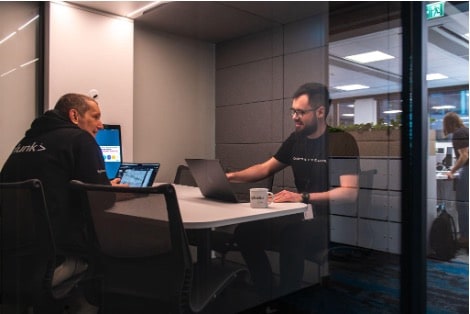Embracing Flexibility to Do Great Work

Flexibility at work can mean a lot of different things, depending on who you ask. But for Splunkers, there is a clear sense of what it means for them: the opportunity to work in the ways that work best for them. This isn’t just about where you work, but how you get your work done. Built on open communication with their managers and teams, a deep desire for collaboration and an open mindset, flexibility shows up across the board for Splunkers.
“Splunk provides a lot of flexibility for employees. We own our own schedules. We determine how, where, and when to spend our time. So for me, as an animal lover, that might look like taking my three dogs for a walk, or spending a little extra time with my asthmatic cat.” - Elliot Reigner, Sr. Solutions Engineer, Indiana, USA
 Dynamic Work For a Dynamic World
Dynamic Work For a Dynamic World
Of course, a part of flexibility includes where you work. Remote work isn’t a concept that was only introduced to Splunk because of the pandemic. Much like Cisco, we’ve been working in a global, dynamic environment for years. That means we’ve had to embed collaboration across different time zones and working environments into our culture. Splunkers have the option to work remotely, or go into any nearby Cisco office.
Because we’re equipped with the technology and best practices for working in a dynamic environment, making the switch from office to remote (and vice versa) is natural for many Splunkers. Sometimes people want to go into an office for greater collaboration, or they find the office environment more productive than working at home. Others might find they get better work done in their home office, or maybe it’s easier to work from a nearby cafe before an appointment.
For Amruta Shah, a talent acquisition partner in our Hyderabad office, this means being able to join her son at a chess tournament in another state. “The flexible work that Splunk offers is a big blessing for me,” she shared. “I get to be the mom I would like to be, spend quality time with my family, and also give 100% to my work.”
It’s Not Cliché if It’s True…
Communication is key to making flexibility work, and critical for establishing trust across our teams. We encourage Splunkers to share how they work best, what they need to be successful, and what flexibility means to them with their managers. For Héctor Arcia, a finance operations leader in Costa Rica, that means feeling comfortable being honest and sharing his personal situations with his manager so they are always in lock-step on how to work best to get things done. Open communication means that you can work together to find ways that can help everyone get better work done, in a way that works best with their unique situations.
Take Software Engineer Gurkan Gokdemir, for example. He has ADHD, which means that trying to focus within a typical 9 to 5 schedule can be difficult. He’s worked with his manager and team to manage his schedule for when he can do his best work. “Meeting with other colleagues, I realized it’s a common pattern at Splunk that you manage your own time. If you think you are best performing in the middle of the night, you can do it — which I do, actually.” Gurkan feels confident and comfortable being offline a few hours a day and spending time with his family and friends, knowing that he has the trust to get his work done when he is most focused later in the evening.
It’s All in the Mindset
Another key component that makes flexibility work is keeping an open mind. While Gurkan called out the great communication he has with his manager and his team, they also had to be open to working with Gurkan in a new way. Splunkers know that innovation happens when we try new things. That spills into the way we approach most things at Splunk, including how we get work done.
 Something else Splunkers know is that we are in a fast-paced world, and that further fuels the need for an open mind. “We are in a very changing time,” says Global Onboarding Program Manager Latoya Sinclair, “so for me leaning into flexibility involves embracing and adapting to change in a fast-paced environment.” She explains that being open minded goes hand-in-hand with flexibility, because it allows people to work in new ways, sometimes even using new technology to help them. “By integrating these practices [for myself as a remote employee], I’ve not only leveraged flexibility for my own benefits, but also helped to create a dynamic and responsive working environment that really supports the needs of teams and organizations.”
Something else Splunkers know is that we are in a fast-paced world, and that further fuels the need for an open mind. “We are in a very changing time,” says Global Onboarding Program Manager Latoya Sinclair, “so for me leaning into flexibility involves embracing and adapting to change in a fast-paced environment.” She explains that being open minded goes hand-in-hand with flexibility, because it allows people to work in new ways, sometimes even using new technology to help them. “By integrating these practices [for myself as a remote employee], I’ve not only leveraged flexibility for my own benefits, but also helped to create a dynamic and responsive working environment that really supports the needs of teams and organizations.”
Collaboration Brings it Together
What really underpins all of this is the desire to find the best ways to work together. Splunkers value collaboration, knowing that we can get better work done when we’re working closely together. The desire to collaborate is what drives us to have strong communication and keep an open mindset, and the benefit is that they all work together to support a flexible work environment.
Anna Walkowiak, a customer trust analyst, is the only member of her team in the Krakow office. Despite that, she says that her team is what keeps her at Splunk because of the connections they have built. She feels that “this team works so perfectly online – the communication here is really working.” For example, whenever she has a question that needs answering, Anna sends a message in their team space. Knowing that her team is in all different time zones, she goes about what work she can until her next teammate comes online wherever in the world they are. “It’s a flow of communication, and all of us are willing to collaborate.”
We’ve all got different ways of working, learning, and communicating. Together, we’ve made a culture at Splunk that supports that through flexibility.
Hear from more Splunkers about how flexibility supports them to do their best work!
Related Articles
About Splunk
The world’s leading organizations rely on Splunk, a Cisco company, to continuously strengthen digital resilience with our unified security and observability platform, powered by industry-leading AI.
Our customers trust Splunk’s award-winning security and observability solutions to secure and improve the reliability of their complex digital environments, at any scale.




